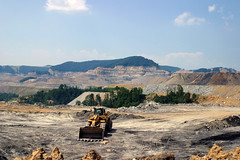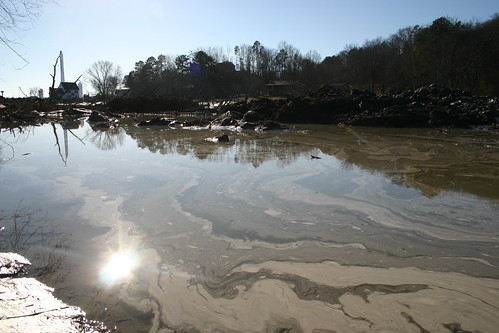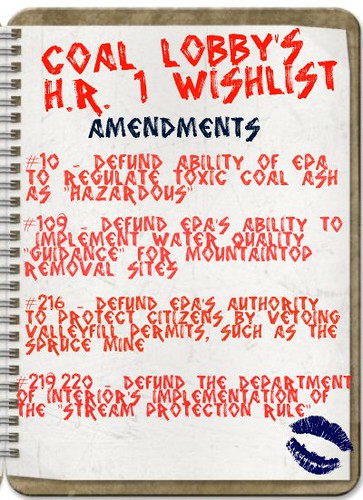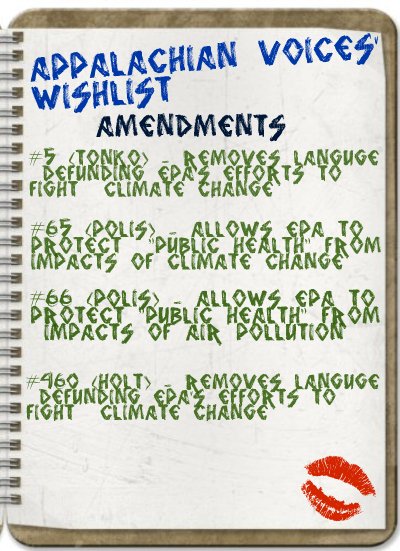We would like to thank Daily Kos and DWG for writing an awesome article about our ongoing legal battle with 3 coal companies and the state regulatory agency in Kentucky. Check out the article here.


Wednesday, March 16th, 2011 | Posted by Eric Chance | No Comments
We would like to thank Daily Kos and DWG for writing an awesome article about our ongoing legal battle with 3 coal companies and the state regulatory agency in Kentucky. Check out the article here.
Thursday, March 10th, 2011 | Posted by Eric Chance | No Comments
Yesterday we announced our intent to sue Nally and Hamilton Enterprises for more than 12,000 violations of the clean water act at more than a dozen of its strip mines in Eastern Kentucky. Click here for more information on that action.
Later in the day we noticed something odd about their website, it was gone. In its place was a slideshow of mostly green reclamation sites and by this morning even that was gone. Click here to see if they have anything on their site now. Luckily we acted quickly and were able to capture their old website, so we thought we would share it here. However, one big question still remains, why are they trying to hide? Any ideas? We look forward to your comments.
Click to enlarge images, then click again to make them full size:
There was one more page, under the History tab but this page just repeated the text on the homepage, so just go to the homepage.
See James Bruggers’ article on this amazing disappearing website.
Wednesday, March 9th, 2011 | Posted by Eric Chance | 1 Comment
Working in coalition with national and state-wide environmental and social justice groups, we are once again seeking justice for clean water in Appalachia.
At 2pm today, Appalachian Voices and partners announced an intent to sue yet another coal company in Kentucky for violations of the Clean Water Act – this time with a single outfit wracking up more than 12,000 violations.
The company named in this newest suit is Nally & Hamilton, a mining operation based in Bardstown, KY and is one of the largest mining companies in eastern Kentucky.
Nally & Hamilton is not known for being a good neighbor to local residents. In one instance, ex-coal miner Elmer Lloyd’s fish pond in Cumberland, Ky was completely destroyed by toxins, sediment, and mud flowing from a Nally & Hamilton owned strip mine above his home.
The notice against Nally and Hamilton alleges that the company may have filed false, potentially fraudulent, water monitoring reports with the state over the past three years, including cutting and pasting previous data in later reports in lieu of submitting actual data for each month. The suit also claims that the company repeatedly omitted legally-required data from its reports.
 Appalachian Voices and its partners previously sued two other coal companies late last year in a legal case that has had as many twists and tangles as an errant patch of kudzu. That case currently has a court date set of June 14.
Appalachian Voices and its partners previously sued two other coal companies late last year in a legal case that has had as many twists and tangles as an errant patch of kudzu. That case currently has a court date set of June 14.
Appalachian Voices and partners, including Kentuckians for the Commonwealth, the Kentucky Riverkeeper, the Waterkeeper Alliance, teamed up with lawyers from Natural Resources Defense Council on this case.
Nally & Hamilton and the state government have 60 days to respond to the allegations.
Thursday, March 3rd, 2011 | Posted by Austin Hall | 1 Comment
U.S. Senators Mitch McConnell and Rand Paul of Kentucky have introduced legislation into the United States Senate that if passed would muddy up The Clean Water Act, and preclude the ability of the EPA to provide adequate protections to drinking water and mountain communities in the coal bearing regions of Appalachia.
Senators McConnell and Paul are framing this legislation as a way to protect coal jobs, when in reality this bill is a further attempt to make sure harmful mines, and our nation’s largest polluters are immune to any meaningful regulatory scrutiny.
The Mining Jobs Protection Act, introduced Thursday morning seeks to revoke a vital power that allows the EPA to veto dangerous mining permits. The bill also significantly reduces the time line the EPA has to scientifically evaluate potentially harmful mountaintop removal permits. Under section 404(c) of the Clean Water Act the EPA is granted the authority to veto a project if the project would cause “significant degradation of municipal water supplies (including surface or ground water) or significant loss of or damage to fisheries”. This is a rarely used tool of the EPA, and that have exercised their veto power only 13 times in the 40 year history of the Clean Water Act- most recently, vetoing the Spruce No. 1 mountaintop removal mine in southern West Virginia.
The Spruce No. 1 Mine was the largest ever proposed surface mine in West Virginia history. The mine would have buried 6 miles of high quality streams, and destroyed 2,278 acres of mountain ridges. Senator McConnell and
The Senators’ proposed legislation is designed to specifically allow the reversal of the Spruce Mine decision. In a region of the country where mountaintop removal mines have already buried over 2000 miles of Appalachian headwater streams in a witch’s brew of heavy metals and chemicals such as arsenic, lead, chromium, mercury, and selenium, this protection in critically important.
The bill would also drastically reduce the time frame is which the EPA can scientifically assess potential water quality and community impacts from mountaintop removal coal mining operations and other fill activities regulated under section 404. The bill gives EPA only thirty days from the day the Corps sends the proposed permit to complete a preliminary analysis of the permit, to notify the Corps of any concerns it has, and provide the Corps a list of measures required to fully address those concerns. The bill then allots only 30 more days (the current time frame under existing regulations is 6 months) for the EPA to analyze a permit, take public comment, and use its veto authority.
This significantly reduced time line would force the EPA to rush through permits they are currently evaluating, causing a hemorrhage of mining permits that would be approved without adequate analysis of potential impacts. Senators McConnell and Paul are framing this legislation as way to protect coal jobs, when it reality, this bill is a further attempt to make sure harmful mines, and our nation’s largest polluters are immune to any meaningful regulatory scrutiny.
Moreover, because the bill applies to all pending permits, and the 60-day time line for required EPA action runs from the date at which the Corps transmits the proposed permit to EPA for review, it appears that the bill also would preclude any possibility of EPA using its veto authority on any pending permits. This has the potential to cause a disastrous situation in Appalachia where dangerous permits would be rubber-stamped, leading to more blasted mountains and poisoned streams.
As Austin Hall, our field organizer, was quoted in the Henderson Gleaner as saying, “The EPA is taking the proper and needed steps to scientifically evaluate these permits and to seriously take into consideration the impacts that mines in Appalachia will have on adjacent communities, to ensure the water quality is protected, to ensure that livelihoods are protected and to ensure that property is protected.”
This is one more serious attack on a growing list of attacks on the Clean Water Act from coal state representatives. Appalachian Voices will continue to fight and oppose short-sighted and dangerous legislative efforts that threaten clean water.
Thursday, March 3rd, 2011 | Posted by | No Comments
By Griff Crews
Communications intern, Spring 2011
The events in “coal news” this week have been thought provoking and encouraging, ranging from the anniversary of one of the greatest coal related tragedies to the recognition of a Kentucky hero by President Barack Obama. So without further delay, here they are:
February 26 was the 39th anniversary of the Buffalo Creek flood that killed 125 people when Buffalo Mining Company’s refuse dam broke. A Citizen’s Commission decided to recommend that Buffalo Mining Company be held responsible for the murder of these citizens. The event was a catastrophe for the entire state of West Virginia and demonstrated the negative impact that coal has on the society as well as the environment.
In other news, a Grand Jury indicted Hughie Elbert Stover, the Security Chief for Massey Energy’s Big Branch Mine, on Monday February 28 for lying to investigators and destroying mine records. A Federal criminal investigation was launched after an explosion in April 2010 at the mine killed 29 people.

But there is hope! On March 1 Arch Coal agreed to pay $4 million dollars for water violations and change their practices to comply with the EPA’s Clean Water Act. The $4 million dollars will be divided in between the Federal Government, Kentucky, and West Virginia. Arch Coal, which provides 16 percent of the United States Coal, was charged with discharging pollutants without permits and not following conditions of permits which they held.
https://upload.wikimedia.org/wikipedia/commons/3/38/Wberry.jpg
March 2 author, conservationist, and advocate Wendell Berry was awarded the National Humanities Medal from President Barack Obama for his writings that explore humankind’s connections with the environment. Berry was involved last month in a sit-in of the Kentucky governor’s office to protest mountain top removal coal mining.
While the news from this week is encouraging, we must continue to heed the reminder of the Buffalo Creek flood and examine coal’s impact on our lives and the environment. As John Collins Rudolph wrote about in his New York Times Blog, a Harvard University Study determined “that coal costs the United States economy $140 billion to $242 billion a year.” The catastrophe at Buffalo Creek was just the tip of the iceberg. The effects of coal on the United States are still here and grow larger every day. Let us continue raising awareness and petitioning our representatives to address the impacts of coal.
-Griff Crews is currently an intern from Appalachian State University where he is studying Communication Studies
Wednesday, March 2nd, 2011 | Posted by Sandra Diaz | No Comments
Cross-posted from Kentuckians for the Commonwealth, one of our partners in our legal action against ICG and Frasure Creek Mining:
The Kentucky Court of Appeals has ruled in favor of KFTC, Appalachian Voices, Kentucky Riverkeeper and the Waterkeeper Alliance by denying the request from the Kentucky Energy and Environment Cabinet and Frasure Creek Mining and ICG coal companies for “emergency relief” from Judge Phillip Shepherd’s Feb. 11 ruling.
The Cabinet and coal companies want to block citizens’ intervention in a consent agreement they reached that addresses the thousands of water pollution violations that were brought to light by the citizens groups in a notice of intent to sue last fall.
“In sum, the fact that petitioners would prefer to settle their differences without submitting to the additional discovery requested by Appalachian Voices (and other groups) simply does not warrant intervention by this Court on an emergency basis. Accordingly, the requested stay must be DENIED.”
The Appeals Court has so far only denied the request for “emergency relief”, which means that Judge Shepherd’s ruling is allowed to stand until the Court of Appeals makes its ruling on the appeal by the Cabinet and the coal companies. This means that the lawyers for the citizens groups will be allowed to move forward with their investigation into the consent agreement and the lawyers will be allowed to depose people in their investigation.
We have no word on when the Court of Appeals will make a final ruling on the Cabinet and coal companies actual appeal of Judge Shepherd’s ruling.
Monday, February 28th, 2011 | Posted by Sandra Diaz | 1 Comment
Cross-posted from AlterNet.org

Big Coal’s backlash over the EPA crackdown on future mountaintop removal operations went from denial and anger to the outright absurd last week, as state legislatures conjured their own versions of a sagebrush rebellion and the new Republican-controlled U.S. House of Representatives passed a sheath of regulatory gutting amendments to its budget bill.
On the heels of its Tea Party-backed coal rallies last fall, the dirty coal lobby couldn’t have paid for a better show. As millions of pounds of ammonium nitrate fuel oil explosives continued to detonate daily in their ailing districts and affected residents held dramatic sit-ins to raise awareness of the growing health crisis in the central Appalachian coalfields, Big Coal-bankrolled sycophants fell over themselves from Virginia to Kentucky to West Virginia, and in the halls of Congress, to see who could introduce the most ridiculous and dangerous bills to shield the coal industry.
Read More ...Wednesday, February 23rd, 2011 | Posted by Sandra Diaz | 2 Comments
Our legal case involving the two Kentucky coal companies’ 20,000+ violations of the Clean Water Act is making Big Coal squirm. On Monday February 21, 2011 Frasure Creek Mining and the Kentucky Energy and Environment Cabinet made an unprecedented move to appeal Judge Shepherd’s decision to the Kentucky Appeals Court. In early February, Judge Shepherd allowed Appalachian Voices, KFTC, Kentucky Riverkeeper and Waterkeeper Alliance to intervene in the proposed settlement between the Kentucky Energy and Environment Cabinet and two of the largest mountaintop removal coal companies (International Coal Group and Frasure Creek Mining) in the state. His decision allowed us to initiate a discovery and deposition process against the two coal companies and the Cabinet in order to determine whether the settlement they negotiated in secret was “fair, adequate, reasonable and consistent with the public interest.”
The appeal by the Cabinet and the coal companies is a blatant attempt to do an “end around” Judge Shepherd by jumping up to the appeals court level before discovery, establishment of facts or even a hearing on the merits. We are preparing an exhaustive response showing why this move is premature, not consistent with Kentucky law and not in the best interest of Kentuckians.
The appeal just shows how desperate they are to avoid third party, independent review of their secret deal. Not surprising since the Cabinet characterized the intervention of citizens groups as “unwarranted burdens.” We expected the coal companies and the Cabinet to pull out all the stops to try and get out of having citizens groups review the circumstances that led to the inadequate consent judgments. The cozy relationship between the Cabinet and the coal companies can’t stand the white hot spotlight of our investigation. They know it and they are squirming like worms on the hook trying to get out of Judge Shepherds court ordered discovery/deposition process so they can keep things hidden. It will be interesting to see if the Appeals Court buys their specious arguments.
In yet another blatant example of how the Cabinet continues to allow the coal companies get away with token clean water act “compliance”, we discovered a huge problem in the proposed corrective action plan submitted by ICG. After the Cabinet completed its investigation of the clean water act violations, they attributed most of the problems to incompetent water monitoring contractors hired by the coal companies. Many of the blatantly false discharge monitoring reports were improperly signed by an unauthorized ICG contractor named Jody Salisbury, an employee of S & S Water Monitoring. The Cabinet announced its settlement with the coal companies noting, “that both GSL and S & S Monitoring, Defendants’ contractors during the time of the subject violations, to the knowledge and belief of the Cabinet, are no longer in business.” Last week we discovered what amounts to a shell game.
The corrective action plan submitted by ICG indicates that from this point forward, their water samples will be collected by a new company called East Kentucky Water Monitoring. According to the Kentucky Secretary of State, that company was incorporated on Dec. 17, 2010 by brothers Jody and Nathan Salisbury who previously worked for S&S Water Monitoring. The filing lists the same Oil Springs, Kentucky address as that previously listed for S&S Water Monitoring. The Salisbury brothers didn’t even bother to get a post office box to hide the fact that East Kentucky Water Monitoring is fundamentally the same outfit as S & S.
Interesting in light of the fact that the state cabinet claims that the inaccuracies are “mostly transcription errors” made by the water monitoring company that took the samples. Why would ICG hire what amounts to the same company that made all those so-called “transcription errors” to continue working for them? One rational reason as to why a company might continue employing an incompetent contractor that cost them thousands of dollars is because that contractor is providing a valuable service by not doing the job correctly. If the average American hired an accountant to do their taxes and they were subsequently audited and fined thousands of dollars by the IRS, would they turn around and hire the same incompetent accountant again?
This bizarre journey began when Donna Lisenby, our Director of Water Programs blew the dust off of water monitoring reports that coal companies are legally required to submit to the state, and that the state is legally required to review. She was dismayed to find higher than allowed levels of pollutants, but also gross and obvious falsification of these reports. Partnering with a number of allies, we submitted our “intent to sue” to the state of Kentucky, who then had 60 days to respond by either taking legal action themselves or allowing us to move forward with our suit.
On the 59th day, the Kentucky Cabinet of Energy and Environment announced their own settlement plan, which laid the blame at the feet of water monitoring contractors, citing above mentioned “transcription errors” as the cause of the discrepancies in water discharge reports. The two companies voluntarily agree to pay a combined total fine of $660,000. This is a pittance (0.1%) of the maximum allowed by the Clean Water Act. For 20,000 violations, the companies could have been fined up to $740 million. The settlement deal cut between the coal companies and the Cabinet is so inadequate that it won’t compel adherence with the Clean Water Act, especially if the exact same contractors continue collecting water samples. It simply does not protect the public’s interest in ensuring safe drinking water.
Ironic that Len Peters, Kentucky Cabinet Secretary recently griped in an Op-Ed that federal Clean Water laws were too onerous for the state to comply with. So why did the Cabinet feel the need to give themselves more work by voluntarily choosing to defend coal companies who are potentially breaking the law, instead of letting our team proceed with our case in federal court? The Cabinet chose to make more work for itself when it entered into a plea bargain with the coal companies giving them minimal fines.
With the appeal made this week, the Cabinet under the Beshear Administration shows they have plenty of staff time and resources to continue taking legal action to defend the coal companies who are polluting public water supplies. In a nutshell, it means Beshear will go to great lengths to allow coal companies to continue polluting while obstinately refusing to use those same resources to protect waterways in Kentucky. It is really sad that the governor and the Cabinet continue to aid and abet law breaking coal companies rather than protect the people. Rest assured that Appalachian Voices, Kentuckians for the Commonwealth, Kentucky Riverkeeper, Waterkeeper Alliance, Appalachian Citizens’ Law Center, Pace Law School Environmental Litigation Clinic and the Capua Law Firm will continue fighting BOTH the coal companies and the Beshear administration until they stop polluting Kentucky waterways. We will not yield or rest until we exhaust every legal means necessary to bring these polluters to justice.
Wednesday, February 23rd, 2011 | Posted by Kate Boyle | No Comments
Well after 10 cities spread across 6 states, the We Love Mountains tour has come to an end. It was a huge success with over 700 people attending concerts, 15 bands that played and hundreds of postcards written to Congress on mountaintop removal.
The shows were headlined by Dewi Sant, a folk indie band based in Minneapolis, MN and kicked off in Charleston, SC in late January. We were joined by Matrimony at our Boone show, who co-headlined the remainder of our tour which ended in Pittsburgh in February.
Other bands that joined the We Love Mountains tour were The Honey Dewdrops, Big Fat Gap, Uncle Mountain , Older Brother, Wylie, 2/3 Goats and Morgan O’Kane.
At each show we made a presentation about mountaintop removal and illustrated the connection to attendees with the destruction in Appalachia. Attendees signed postcards showing their support for the Clean Water Protection Act and the Appalachian Restoration Act.
The Charlotte Loves Mountains show was covered in the Charlotte Observer. Other concerts were covered in the Mountain Times, The Blue Banner, and The Mountain Express.
The tour inspired many new individuals, who had not yet been exposed to mountaintop removal or their connection to it, and as a result we will be a stronger movement in many critical regions of the east coast.
Many thanks to Restoring Eden who were the partnering organization in this tour and Anna Jane Joyner who recruited the bands and much of the logistics.
Monday, February 21st, 2011 | Posted by JW Randolph | 2 Comments
The Stakes are High for Appalachia as the Fight Moves to the Senate

Late Friday night and into the wee hours of Saturday morning, the long-anticipated assault on clean air and clean water laws began in the House of Representatives. At 4:39AM on Saturday morning, Republicans passed their bill with zero Democratic support, and only three Republican dissenters (Jones (NC), Flake (AZ), Campbell (CA)).
The House approved a number of amendments to the budget bill (H.R. 1) that would prevent the EPA from updating rules on mountaintop removal permitting, coal ash storage, emissions of coarse particulate matter, and a variety of other clean air and clean water safeguards. Those amendments that were attached included the coal lobby wishlist of #109, #216, #217 (previously labeled as #10), and #498 (previously labled as #219/220) These were revenue-neutral amendments, meaning they weren’t aimed at reducing the federal budget deficit, but were designed solely to prevent the EPA and other government agencies from updating and enforcing clean air and clean water laws. In short, it was Christmas for polluters.
Fortunately, the House version of the budget bill is only the first step, and for any of these rules to take effect, they must also pass the Senate and be signed into law by the President.
(more…)
Thursday, February 17th, 2011 | Posted by JW Randolph | No Comments
They don’t fix HR 1, but These Amendments Could Help Protect Appalachia
Appalachian Voices strongly supports the following amendments to HR 1:

5 (Tonko)
Amendment No. 5: Page 276, beginning on line 4, strike section 1746.
65 (Polis):
Amendment No. 65: Page 276, line 11, insert “, except for expenditures that the Administrator of the Environmental Protection Agency determines to be necessary to protect the public health or prevent severe environmental degradation” after “climate change”.
66 (Polis):
Amendment No. 66: Page 276, line 8, insert “or other authorities under the Clean Air Act that the Administrator of the Environmental Protection Agency determines to be necessary to protect the public health or prevent severe environmental degradation” after “Clean Air Act”.
460 (Holt).
Amendment No. 460: Page 276, beginning on line 4, strike section 1746.
The House has yet to vote on these or any of the coal lobby’s favored amendments.
Wednesday, February 16th, 2011 | Posted by Eric Chance | No Comments
Last night (February 15) the Boone Town Council passed strict new regulations aimed to limit the impacts of coal tar based asphalt sealants.
Coal tar based asphalt sealants are terrible for the environment and have serious human health effects because they are a major source of polycyclic aromatic hydrocarbons (PAHs). If you have ever stood in a parking lot that is really black, that is coal tar asphalt sealant, and if it smelled like tar or weird chemicals, those are the PAHs. There is really no reason to use this type of sealant, because asphalt based sealants are the same price and are far less toxic.
Although, the regulations do not outright ban the use of coal tar sealants, they do make it much more difficult. The regulations set up a permitting process, for anyone wishing to apply a pavement sealant. There will be a minimal fee for non coal tar based sealants, and a much higher fee for coal tar sealants. The permitting process is designed to allow for education on pavement sealants, and to ensure that sealants are applied in a safe manner (like when there is no chance of rain). The new permitting process will be implemented April 1, to allow for time to develop education materials and finalize the fee structure.
These new regulations are in response to the Hodges Creek fish kill. This past summer the BB&T on Highway 105 in Boone applied coal tar based asphalt sealant to their parking lot in the rain. The sealant washed off into Hodges Creek, killing all life in the creek until its confluence with Boone Creek, near the mall, 1.5 miles downstream. Shea Tuberty of Appalachian State told the town council that he had done sampling in Hodges Creek in January, little life has returned to the Creek, six months after the spill.
Thanks to everyone who came out to the town council to stand up for clean streams!